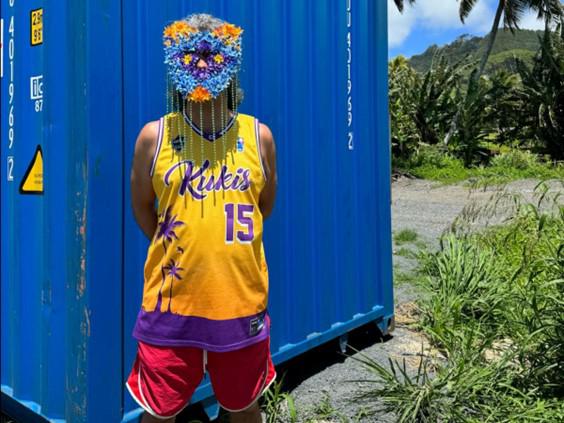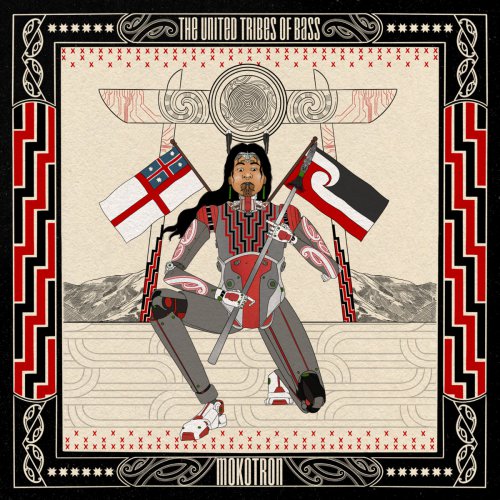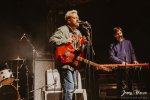Music News - Mokotron shares Big Fat Raro remix 'Decolonize Existence'

13 March 2024 - 0 Comments
Mokotron is a Tāmaki-based Māori producer from Ngāti Hine, who spreads seismic waves of low frequency Indigenous electronic music. Exploring ancient futurism through music, Mokotron imagines a reality without colonisation, where the ancestors transition from the ancient world into the modern, creating futures of hope juxtaposed with the hard realities of urban disconnection.
2022 was a breakout year for Mokotron releasing two 12” EPs on Spanish label Electro Records, as well as featuring on digital compilations assembled by Crazed Behaviour (UK), Ovelha Tracks (Portugal) and Strange Behaviour (Te Whanganui-a-Tara, Wellington). Their independently released EP Tawhito was awarded Te Tohu Hopunga Puoro Mariu (Favourite EP / Mixtape) at the 2022 Student Radio Network Awards, with the title track placing fifth on the network’s SRN TOP 10 for the year.
Mokotron returns with another knock out rework of their track Decolonize Existence (Big Fat Raro Remix). It's the second single to be released from an upcoming remix album The United Tribes of Bass. Out digitally on March 22, The United Tribes of Bass is a landmark remix album, exclusively featuring Māori and Cook Island Māori electronic practitioners from throughout the motu.
STREAM MOKOTRON - DECOLONIZE EXISTENCE (BIG FAT RARO REMIX)
SPOTIFY
BANDCAMP
APPLE MUSIC
YOUTUBE
Big Fat Raro is the creative moniker of Tokerau Brown (ia, Kuki Airani), a multidisciplinary artist, animator, curator and musician based in Tāmaki Makaurau. Brown is a key personality in Fanau Spa and Mental Health Triangle, started up the Māori Pasifika animation house, Studio Ki'i Pili and is co-director of Wheke Fortress.
Big Fat Raro's remix of Colonised Existence flips the script on the original, switching up the brooding electro for an optimistic electronica.
Brown reflects "Firstly I just want to mihi to Mokotron for inviting me to remix Colonised Existence. As tauiwi Pasifika living in Aotearoa, I have always acknowledged Tangata Whenua as the true landowners and kaitiaki here. The navigator Kupe launched from Rarotonga, the birthplace of his father upon his voyage to Aotearoa. As Cook Island Māori I also acknowledge these ancestors, the complex rhythms, the DNA and shared histories that connect Mokotron and I. My name, Tokerau, means North across the Pacific but North West in the Cook Islands. I was also born in Rawene, in Te Tai Tokerau. There are layers to this."
"I love how dark and confronting Mokotron's original track was, with its strong, uncompromising lyrics. It has a Māori electropunk/goth sensibility and speaks 'forbidden' truths unashamedly. A true outpouring responding to the history of racism in Aotearoa, a painful and first-hand experience for both of us."
"Initially I had planned to write something as a call and response, so slotting lyrics in between each of Mokotron's lyrics. I was bouncing off each idea and coming back with a positive call to action. So the first lyric Colonised Existence I wondered how to flip that. The only answer: Decolonize Existence! This is the only way to save the planet, through complete decolonisation: returning the social systems, the caretaking of the land, the rivers, the sea back to indigenous peoples across the world."
"The song is a call to all peoples of the Pacific, to start on your decolonising journey. That ongoing process and work has changed my world for the better. Hardly anyone wears pareu in the inner cities, except for maybe Tāmaki Makaurau. That was the simple first step on my journey, wearing pareu on the daily with my hoody. That small act led to many others... and here I am. It's the indigenous jailbreak, free your mind one act a time."
Speaking to the original Mokotron notes that "Colonised Existence was the first proper Mokotron tune. Because this project is about being urban Māori, my first song had to be about how I came to be in the city, being ripped away from my whānau, whakapapa, reo and tikanga and screaming soundlessly into the urban void. This is the darkest tune I’ve ever written."
"Tokerau's remix moved me to tears because they responded to my despair with hope and aroha. The strings express an inescapable tragedy of loss, so recontextualising them within a message of hope transforms them into a crescendo of support. I love that they only sampled one word from my vocal, ‘resistance’, but replied to it by reminding me we also need to ‘have some fun’. The remix is a lesson for me."
The United Tribes of Bass will feature remixes and reworkings by Caru, along with Big Fat Raro, Akcept, Netana, Hasji, DJ Oboe, Galoleafi and Big Wā.

Photo Credit: Sione Tuivailala Monū
Most Viewed Artists
Latest Galleries
NZ Top 10 Singles
- APT.
ROSÉ And Bruno Mars - DIE WITH A SMILE
Lady Gaga And Bruno Mars - BIRDS OF A FEATHER
Billie Eilish - TASTE
Sabrina Carpenter - I LOVE YOU, I'M SORRY
Gracie Abrams - ESPRESSO
Sabrina Carpenter - SAILOR SONG
Gigi Perez - LOSE CONTROL
Teddy Swims - A BAR SONG (TIPSY)
Shaboozey - GOOD LUCK, BABE!
Chappell Roan








 Report A Problem
Report A Problem


There are currently no comments for this article. Please log in to add new comments.